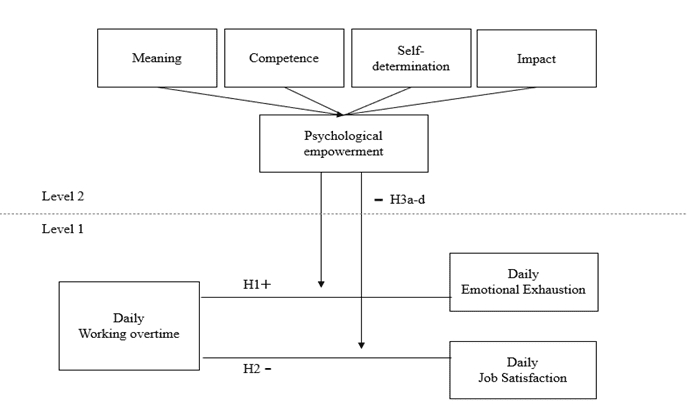The dangers of working overtime: how does it affect your well-being?
Our Market Researcher Niek Klaver graduated in January with his thesis about the relationship between working overtime, employee satisfaction and emotional exhaustion. Below you can find a summary of his research; how he designed his study, what the outcomes were and what organizations can take away from this.

Working Time: its negative consequences and how to manage it.
In November of 2003, the European Working Time Directive (EWTD) was issued. This directive states that employers need to ensure that their staff, on average, does not work more than 48 hours per week, including working overtime. The reason for this directive was that research found that working long hours is related to several negative mental health effects, such as emotional exhaustion, stress, and depression. These findings sparked interest within the field of organizational psychology on working overtime and its effects on employee well-being. Therefore, my goal was to gain more insights into these topics through my own academic research.
What do we want to measure?
As outcome variables, I decided on emotional exhaustion and job satisfaction.
Emotional exhaustion is currently a hot topic, as it is often seen as a core component of burnout. It can be described as the sensation of being overburdened and emptied of one’s emotional resources. Additionally, job satisfaction is an important topic in organizational psychology. Job satisfaction can be regarded as a mix of environmental and psychological factors that might cause someone to honestly confess satisfaction with the task. It is an important part of organizational research, as it has strong consequences for employee turnover and performance. For this reason, it is important to gain deeper insights into how working overtime impacts these variables.
The basis for this research is the job demands-resources model. This model states that job demands are stressors that can lead to decreased employee well-being. These stressors can be diminished through job resources, which are positive work aspects that increase engagement and performance. Therefore, in this research, the goal was to gain insights into how each aspect of psychological empowerment, as job resources, impact the relationships between the job demand working overtime, and our outcome variables, job satisfaction, and emotional exhaustion.
The moderating variable
As a relatively new term, the effects of psychological empowerment have not been studied much. It was coined by Spreitzer in 1995 and described as “an intrinsic task motivation reflecting a sense of self-control in relation to one’s work and an active involvement with one’s work role”. This variable is divided into four aspects:
- Meaning; the value of a work goal or purpose, judged by relation to an individual’s ideals or standards.
- Competence; regards an individual’s belief in their capability to perform activities with their skills and competencies.
- Self-determination; the sense of having autonomy when it comes to decision-making.
- Impact; the degree to which the employee can influence the strategic, administrative, or operating outcomes at work.
What is the design for this study?
For the study design, a daily repeated measures approach was chosen. This method is often referred to as a daily diary design. The benefit of the daily diary study design is centered around its ability to capture the daily fluctuations of the outcome variables as they often do not remain constant for people and instead fluctuate on a day-to-day basis. The participants had to be older than 18 and working under contract, so that there was a documented number of hours that they were paid to work. All hours worked besides the documented number of hours were regarded as hours worked overtime. Initial contact with participants was done through social media with a baseline survey to establish demographical information for the control variables as well as their level of psychological empowerment. After that, participants were required to answer a daily survey for a minimum of 15 times or three full work weeks. They were instructed to fill out this survey as soon as they stopped working that day, for the most reliable results.

What did I find?
Through an in-depth multilevel linear regression of the data, I was able to gather my results. These results showed that:
- Daily working overtime negatively impacted employees’ daily emotional exhaustion and daily job satisfaction.
- The moderating effect of the four aspects of psychological empowerment was not as definitive.
For the relationship between working overtime and job satisfaction, only self-determination showed a significant mitigating effect. This indicates that when participants score high on self-determination, they were less likely to experience decreased levels of job satisfaction on days where they worked overtime. I also found, similarly to other studies, that only meaning moderated the relationship between working overtime and emotional exhaustion. Meaning has frequently been regarded as a prime source of internal motivation for work, so it is unsurprising that meaning works as a job resource for emotional exhaustion. That being said, it is surprising that meaning was insignificant as a moderator for the relationship between job satisfaction and overtime work. However, meaning was found to be directly related to job satisfaction, which indicates that when employees’ values are in line with a company’s values, they will experience higher levels of satisfaction with their work.
But what do these results mean for companies?
Firstly, this research provides an argument that working overtime should only be used sparingly, as working overtime leads to increased emotional exhaustion, which in excess could lead to burnout. Moreover, the results of this study show that working overtime can lead to decreased job satisfaction, which in turn can lead to decreased performance or decreased turnover.
Secondly, this research provides proof for the job demand-resources theory, as meaning and self-determination were job resources for emotional exhaustion and job satisfaction, respectively. This shows that the negative effect of job demands can be mitigated by positive organizational components. However, more research is necessary to give a definite answer on the effects of psychological empowerment as a moderator for the negative effects of working overtime.
Lastly, this research showed that willingness to work overtime also diminished the negative effects of working overtime. Therefore, when working overtime is beneficial or unavoidable for the organization, gaining insights into employees’ views regarding working overtime can be valuable.
This article is written by

Irma Doze

Gido van Puijenbroek

Claudia Ceton

Alex Hellemons

Jan Tuijp

Jilske Hupkes

John Martens

Marjolijn Cornelissen

Michael van den Hoek

Ramona Boes

Sanne Brons

Wino de Vries

Financial Service Provider C
AnalitiQs built 4 interactive HR Dashboards, with each another theme. Curious how we did this?…
Read more
Financial Service Provider E
In this case you can read how AnalitiQs helped the client to make the data-processes…
Read more
Financial Service Provider A
With the help of AnalitiQs this client made the change to Datadriven HR, also known…
Read more
Financial Service Provider D
Which personal characteristics, work and organizational conditions lead to absence? Read how AnalitiQs tackled this…
Read more
Dennis van den Berg

Vladimir Hazeleger

Koen Stuyven

Ravish Sitaram

Billy Griep

Nele Wensauer

Yves Kistemaker

Kika Banning

Ninande Vermeer

Wouter Lely

Ronald Lenselink

Sterre Visser

What is the effect of a vitality program?
An analysis of a vitality program – are employees becoming more vital?
Read more
Rashel Mol

Henrieke van Bommel

Erik Juliaan van der Gaag

Kevin O’Driscoll

Qualitative research on Diversity & Inclusion at a Dutch multinational
Diversity & inclusion research through interviews and focus groups uncovers areas for improvement and leads…
Read more
Joyce van Groningen-Plakké

Stan van Loon

Niek Klaver

The way you improve employee satisfaction after an organizational change
How do you measure the impact of a culture change?
Read more
Tim Bleeker

Thomas Ardern-Mulhern























